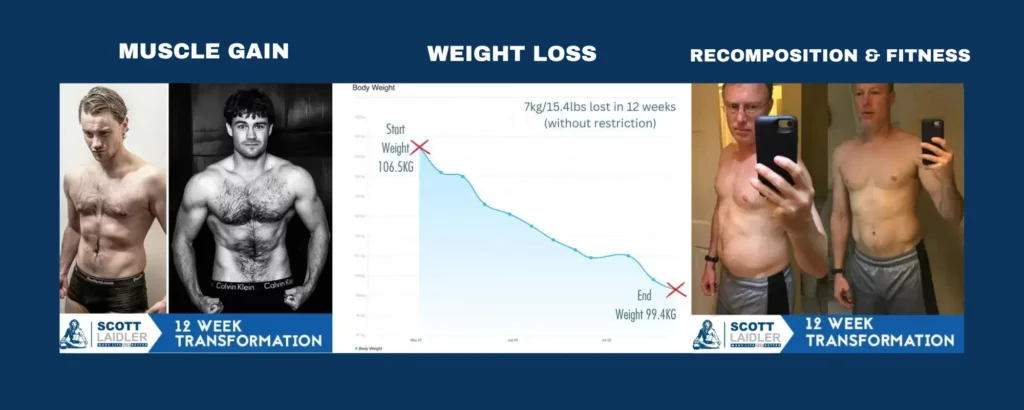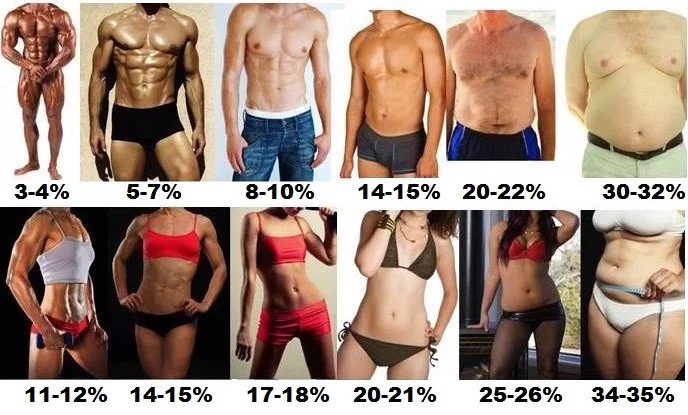How much weight can you lose in 12 weeks?
It’s a question that potentially inbound clients ask personal trainers like myself ‘Can I see good results in just 12 weeks?’ To which I generally answer that with a consistent exercise practice.
Of course, that’s not to say that everyone can complete a total body transformation and walk around as the completely finished article after just 12 weeks. But at the same time, after 14 years as a fitness coach, I’m yet to see someone who completed one of my programs to at least 80% compliance rate and not see a clear visible difference in side-by-side progression pictures.
First of all, to show what is possible in 12 weeks, Let’s showcase some of the results I have gotten with my clients over this timeframe:

As I alluded to above, whether results like these will be typical of a 12-week training program is going to come down to two crucial factors.
How to approach weight loss successfully
The first is the responsibility of the coach to in essence create the perfect personalised fitness blueprint or to architect an overall coaching strategy to deliver results.
Second is the joint responsibility of the candidate and the fitness coach to actually see that blueprint through to its completion. In my view, the coach should be a compliance rate of 80% in aggregate. Not 100%, because perfectionism can actually derail progress and if a program is comprehensive and multi-faceted enough no one setback or missed element should be able to derail it.
The role of the candidate, therefore, is to consistently implement the workouts, eat the meals and deliver on the lifestyle factors that influence the success of the program. The responsibility of the coach is to keep the candidate accountable throughout the process.
There are two big factors at play here:
1. Contrast
There is a big difference as to what can be achieved in 12 weeks if you are coming into a new training program or health initiative without everything being perfect beforehand, simply because there is a lot of low-hanging fruit. Essentially when you optimise eating habits, workout structure and methodology, you will see very fast results. Whereas if you had everything perfect for a whole year in the run-up to an online personal training program and then optimised very small details you would be looking at marginal improvements.
For most people who seek out a personal trainer, the changes that can be achieved in 12 weeks are very impressive, this is how we came to have the classic ‘12-week body transformation‘.
2. Consistency
The other big factor at play when discussing how much can be achieved in 12 weeks is going to be down to consistency. You could have the perfect 12-week workout program but unless it’s followed consistently it isn’t going to deliver. I don’t say that to be some kind of drill sergeant, it’s to plant the seed that consistent action aggregates, carries forward it’s own momentum and delivers results exponentially.
When looking to turn your health & fitness around, there are often several aspects of lifestyle you could improve to influence your success that I would consider ‘low-hanging fruit’. The first of these is making exercise a steady feature of your lifestyle, rather than just something you’ll do for the 12 weeks. This completely reframes the idea in your mind.
I speak with many clients who are active but just aren’t seeing the progress they would like, and by speaking with a personal trainer, you will be able to establish the most linear route to your goals. Meaning that you’re going to make more progress at the fastest rate that doesn’t undermine your long-term interests. Put another way this is home you get excellent results without rushing and cutting corners.
There are two other lifestyle factors you’ll need to monitor to get the best out of a 12-week exercise program. The first is managing your stress levels. Of course, this is often easier said than done, but I would be remiss not to point out that a lack of sleep can impact both how your body stores and burns abdominal fat and your ability to gain and maintain muscle mass. Not to mention high stress levels making it more likely that someone is going to comfort eat. This is because of the effect stress has on appetite-regulating hormones such as leptin and ghrelin.
The other factor that is going to massively impact your goals is your ability to get adequate sleep, for many of the same reasons. In that, a lack of sleep will make it both physiologically more challenging to achieve results in fitness and also on a behavioural level as one would be more likely to reach for food they never intended to eat when sleep deprived, and also perhaps be make it less likely to get an effective workout due to just being too tired to face it.
What to expect after 12 weeks
Fat loss is usually quicker to achieve than muscle growth. However, pursuing this goal too aggressively can jeopardise hard-earned muscle mass. In many cases, taking a steadier, incremental approach to fat loss can be beneficial in the long term, and make it less likely that you’re going to put that weight back on once the program is finished. To that point, muscle growth typically takes months, rather than weeks, although this can vary from person to person due to a huge number of factors such as their current level of conditioning, experience with exercise etc.
Let’s have a look at what results could reasonably be expected over 12 weeks:
Fat Loss
If you take considerable steps toward creating a lifestyle that will naturally burn more fat than it accumulates then you could look to achieve substantial fat loss.
Aiming for a pound of fat loss per week is reasonable. You can then calculate what that rate of weight loss would mean for your body fat percentage. One nuance here is that fat loss is more of a linear goal, you want to aim for a fairly consistent rate of fat loss throughout a 12-week period. However, the aesthetic results don’t always appear as linear. At various body fat percentages, your body can look very different almost as if there are ‘levels’ of leanness. This is why I tend not to recommend my clients drop down below 10-12% for men and 18-20% for women, because past that point you may have to restrict too heavily for diminishing returns.

Weight Loss
I would always suggest that a weight loss goal be approached through the lens of recomposition which means to prioritise fat loss and muscle preservation rather than seeking indiscriminate weight loss on a scale.
Having said that, sometimes there is just a lot of weight to lose. This makes the goal different from fat loss, but that doesn’t mean the weight should be pursued at the cost of muscle. Typically with a weight loss goal, you can expect to see substantial upfront weight loss in the early weeks. It’s not uncommon for example to see 6-8lbs of weight loss within the first 2 weeks of a weight loss program. The advanced rate is essentially due to the fact that things have gone from sub-optimal to optimal.
However, after that, it’s normal for the rate of weight loss to slow down somewhat. This is normal and actually intended as it is important that weight loss be approached in a non-restrictive manner if it’s ever to be maintained long-term. This is of course why dieting just doesn’t work as a long-term solution.
Muscle Gain
A 12-week muscle-building goal can yield excellent results when the mechanics of muscle-building are consistently maintained. This means maintaining progressive overload, exercising with good technique (for muscle recruitment) and tracking workouts consistently. Typically I advise my online personal training clients to stay in a given training protocol for 4-6 weeks. Typically followed by an active rest week to recover before beginning a new muscle-building protocol. This is how muscle building is approached to deliver consistent results. To be clear then significant muscle gain can be gained over 3 months, and the less conditioned and experienced you are at the beginning of a program, the greater the potential upside for you due to the body benefitting from a stark contrast.
The second lifestyle change would be to get fully on top of your nutrition. I’ve worked with clients who exercise frequently but historically haven’t made the progress they’d have liked because they don’t know how to eat for their fitness goals. A coach can offer you personalised nutritional advice, tailored to your goals. Counter to the logic of fad diets, extreme calorie restriction isn’t the way to achieve good progress – your body needs fuel for the increased level of activity you’ll be doing on a structured exercise program.
Again, too much restriction may deliver shock weight loss in the early weeks. But you may lose muscle mass in the process and will likely just regain that weight once the program comes to an end.
Positioning your initial 3-month exercise program as the first step toward sustainable fat loss that you can keep long into the future is far more effective. This way any great fitness program can be viewed as both a vehicle to deliver excellent fitness results, but also as a learning process that will teach you how to establish and maintain the kind of lifestyle that will naturally allow you to keep the results you get from the program.
Thirdly, consider your activity level outside of your workouts. Although it may not feel like a ‘workout’, your body burns the most calories from fat with activity at around 100-120BPM. Splitting your focus between structured resistance training and lower intensity ‘steady-state cardio’ will help you to achieve positive recomposition, i.e. gaining muscle and losing fat simultaneously.
Could an online personal trainer help you get results?
Regardless of your goal, the best shot you have of getting in shape in 3 months is to speak with a fitness coach, who will be able to give you the toolkit to set and achieve your exercise goals in the most linear way. It will take discipline and a willingness to apply your efforts across to every aspect of your life, but by removing the guesswork, you can make great progress in 12 weeks as well as laying a strong foundation for continued improvements in health and body composition for the rest of your life.